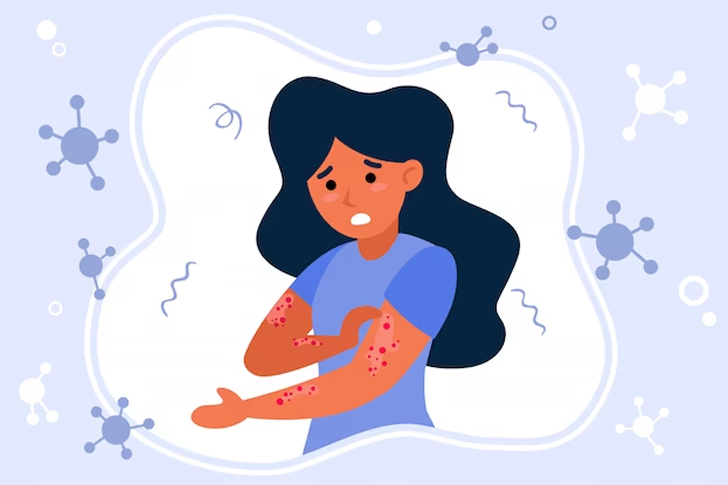Atopic Dermatitis, commonly known as eczema, presents various symptoms that can be managed with appropriate care and lifestyle adjustments.

Atopic dermatitis, commonly known as eczema, is a chronic skin condition characterized by dry, itchy, and inflamed skin. Managing atopic dermatitis involves understanding its symptoms, triggers, and effective treatment strategies. Here’s a comprehensive guide to help you manage eczema effectively:
Symptoms of Atopic Dermatitis
- Dry Skin: Skin may feel rough, scaly, or tight.
- Itching: Intenseitching is often the first symptom and can worsen at night.
- Red or Brownish-Gray Patches: These can appear on various parts of the body, including the hands, feet, ankles, wrists, neck, upper chest, eyelids, and inside the bend of the elbows and knees.
- Thickened, Cracked Skin: Chronic scratching can lead to thickened, leathery skin (lichenification).
- Small, Raised Bumps: These may leak fluid and crust over when scratched.
- Sensitive Skin: Skin may become more sensitive and reactive to products or environmental factors.
Tips for Managing Atopic Dermatitis
1. Moisturize Regularly
- Use Emollients: Apply a thick moisturizer or emollient immediately after bathing and throughout the day to lock in moisture.
- Choose the Right Products: Look for fragrance-free and hypoallergenic products. Creams and ointments are often more effective than lotions.
2. Identify and Avoid Triggers
- Common Triggers: Identify personal triggers, which may include allergens (like pollen, dust mites, pet dander), irritants (such as soaps, detergents, and fabrics), temperature changes, and stress.
- Keep a Diary: Track flare-ups in a diary to help identify patterns and triggers.
3. Practice Good Skin Care
- Gentle Cleansing: Use mild, fragrance-free cleansers and avoid hot water, which can dry out the skin.
- Short Baths: Limit bath time to 10-15 minutes and use lukewarm water. Pat skin dry gently and apply moisturizer immediately afterward.
4. Use Medications as Needed
- Topical Corticosteroids: These can reduce inflammation and itching during flare-ups. Use as directed by a healthcare provider.
- Calcineurin Inhibitors: Non-steroidal creams (like tacrolimus and pimecrolimus) can help manage inflammation and are suitable for sensitive areas.
- Antihistamines: Oral antihistamines can help reduce itching, especially at night.
5. Wear Appropriate Clothing
- Choose Breathable Fabrics: Opt for soft, breathable fabrics like cotton. Avoid wool and synthetic materials that can irritate the skin.
- Loose-Fitting Clothes: Wear loose clothing to minimize friction and irritation on the skin.
6. Manage Stress
- Relaxation Techniques: Engage in stress-reducing activities such as yoga, meditation, or deep-breathing exercises, as stress can exacerbate symptoms.
- Regular Exercise: Physical activity can help reduce stress and improve overall well-being.
7. Maintain a Healthy Diet
- Anti-Inflammatory Foods: Incorporate foods rich in omega-3 fatty acids (like fish, flaxseeds, and walnuts), fruits, and vegetables to support skin health.
- Stay Hydrated: Drink plenty of water to keep skin hydrated from the inside out.
8. Consider Allergy Testing
- Consult an Allergist: If you suspect allergies may be contributing to your eczema, consider seeing an allergist for testing and guidance on managing allergens.
9. Use Wet Wrap Therapy
- Wet Wraps: For severe flare-ups, wet wrap therapy can help hydrate the skin and reduce itching. Apply moisturizer, then wrap the area with damp gauze or clothing, followed by a dry layer.
10. Follow Up with Healthcare Providers
- Regular Check-Ups: Schedule regular appointments with a dermatologist or healthcare provider to monitor your condition and adjust treatment as needed.
- Discuss New Treatments: Stay informed about new treatments and therapies that may be available for managing atopic dermatitis.
Conclusion
Managing atopic dermatitis requires a proactive approach that includes regular moisturizing, identifying triggers, and using appropriate treatments. By implementing these strategies and working closely with healthcare providers, individuals with eczema can effectively manage their symptoms and improve their quality of life. If you experience severe symptoms or frequent flare-ups, consult a healthcare professional for personalized advice and treatment options.









